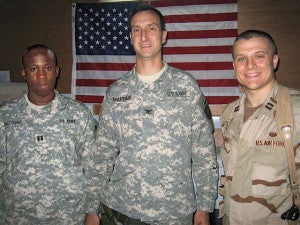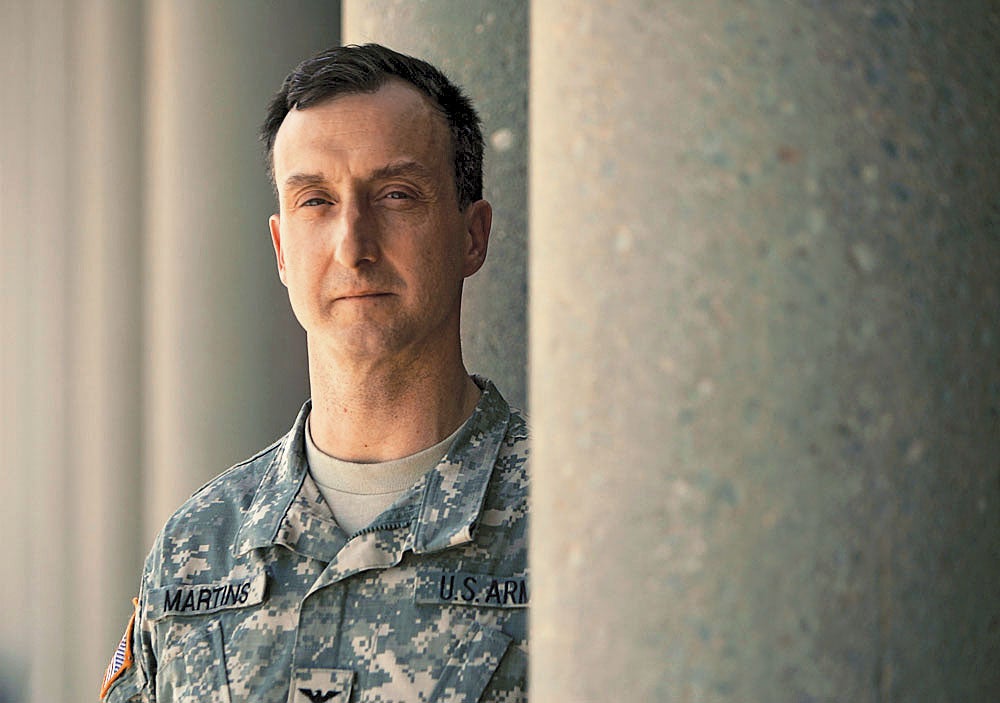Take the path of law, says the senior military lawyer in Iraq
By Mark Martins ’90
The news from Baghdad this month tends to make me share Oliver Wendell Holmes Sr.’s famous preference for “not so much where we are, but in what direction we are moving.”
Where we are—and by “we” I mean the new Iraqi government and the 27 coalition partners whose presence it continues to welcome—is by no measure acceptable. Innocent Iraqis are still dying in large numbers, and attacks on critical infra-structure prevent the quantum improvements in quality of life that could persuade more citizens to believe in Iraq’s future.
Yet, despite these formidable obstacles, the Iraqi government and its partners in the multi-national force are moving in the right direction. One certainly needs a wider-angle lens to see it, but the favorable movement is undeniable.
Since April 2004—the one-year anniversary of the fall of Saddam Hussein’s government—Iraqis have reached every major political milestone, including the December 2005 election, in which nearly 12 million voters from all sects and groups elected a full-term legislature.
For sure, continued progress will depend not just on strengthening the democratic process. It will depend on law. It is noteworthy that Iraqi government leaders, and also members of the multinational force, appear increasingly aware of an old principle, restated in a compelling new Army and Marine Corps manual on counterinsurgency: Every action of the counterinsurgent should be anchored in law. Any effort to build a legitimate government through lawless action—including unjustified or excessive use of force, unlawful detention, torture or punishment without trial—is self-defeating.
The potential for stability that law offers and that I believe is within Iraq’s grasp competes poorly for media airtime with the horrific images of explosions near markets and mosques, and the forecasts of civil war. It is a potential that will be realized when a substantial majority of Iraqis considers its leaders to have been fairly selected, when corruption decreases significantly, when political and economic development proceed at a culturally tolerable rate, and when power is meaningfully checked by individual and minority rights. I am not one to blog that only the sensationally bad news is reported back home—that’s inaccurate and unfair—but it will be a decidedly unsensational respect by the Iraqi government for legal rules that will gain it widespread and enduring support.

Such respect is the essence of the rule of law, which nearly 500 judge advocates and paralegal specialists throughout the country are promoting. While participating in the Maliki government’s counterinsurgency campaign, coalition forces are themselves accountable to a wide variety of international, Iraqi and home state laws. The team of lawyers deployed to help commanders and units wage that campaign is both multistate and multinational—our ranks include lawyers from most U.S. states, the United Kingdom and Australia, and many law schools. Capts. Earl Matthews ’98 [U.S. Army] and Robert Caridad ’03 [U.S. Air Force] join me in representing HLS.
We have many specialties, including international law, operational law (command advice on rules of engagement and operations orders), administrative law, legal assistance, federal appropriations and procurement, foreign claims, criminal prosecution and defense, and support to Iraqi investigative and judicial bodies (such as the Central Criminal Court of Iraq). Information technology has revolutionized field legal practice, making all manner of materials available even in remote locations, and the judge advocates general of the Army, Navy and Air Force push expertise and support to us when needed. Proceedings under the Uniform Code of Military Justice and other adversarial processes demand world-class advocacy and representation, some of it in high-profile trials. A number of attorneys serve outside of the more traditional judge advocate roles, liaising with Iraqi officials and legal advisers, alongside Department of State, Justice and other coalition government colleagues. The counsel I lead tell me they are having the best professional experiences of their lives.
But there are sacrifices and hazards. Many of us have been deployed to Iraq or Afghanistan more than once, and a yearlong tour typically includes a single two-week stint of R&R back home. Uniformed legal personnel traverse dangerous roads and airspace. One judge advocate in his first assignment out of law school found himself called to support a nearby patrol pinned down by small arms, and he exposed himself to fire to save the life of a soldier who had lost a limb. Recently, a paralegal specialist defended her convoy by returning fire with the machine gun atop her humvee, and three legal personnel survived IED explosions near their vehicles. Four other legal personnel have made the ultimate sacrifice.
I harbor no illusions that our path will get easier any time soon. This government needs more physical security for its judges and courts, more trained criminal investigators, more field training of the Iraqi Police Service, more commitment to anticorruption principles and human rights, and more resources for and accountability within its jails and prisons. It needs new laws to liberalize the economy, encourage national reconciliation, provide greater civil and criminal due process, and promote the role of physical and forensic evidence while decreasing reliance upon confessions.
None of these needs can be satisfied overnight, another sobering fact about where we are that Holmes could be forgiven for disfavoring. Yet I am persuaded that Iraq’s government and people are committed to prevailing in this deadly struggle. I am also humbled by the idealism and bravery I see in our soldiers, sailors, airmen and marines. They remain equally committed to supporting a worthy ally and assisting all those Iraqis whom they have befriended. To alter course dramatically now would be to move in a seductive but regrettable direction.
